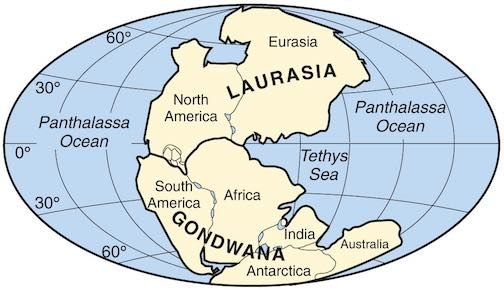
Gondwana [gond-wah-nuh] ExamplesWord Origin noun
- a hypothetical landmass in the Southern Hemisphere that separated toward the end of the Paleozoic Era to form South America, Africa, Antarctica, and Australia.
Compare Laurasia. Origin of Gondwana First recorded in 1870–75 Also called Gond·wa·na·land. Examples from the Web for gondwana Historical Examples of gondwana
She is more worshipped in Gondwana and the forest tracts to the east and south of it than in any other part of India.
Encyclopaedia Britannica, 11th Edition, Volume 15, Slice 6
Various
The upper part of the Gondwana series is not improbably Jurassic.
Encyclopaedia Britannica, 11th Edition, Volume 15, Slice 5
Various
A strip of Gondwana beds follows approximately the course of the Godavari.
Encyclopaedia Britannica, 11th Edition, Volume 17, Slice 3
Various
Upper Gondwana beds also occur in small patches at several other places near the east coast.
Encyclopaedia Britannica, 11th Edition, Volume 17, Slice 3
Various
The Gondwana series is in many respects the most interesting and important series of the Indian Peninsula.
Encyclopaedia Britannica, 11th Edition, Volume 14, Slice 4
Various
Word Origin and History for gondwana Gondwana
name of a region in north central India, from Sanskrit gondavana, from vana “forest” + Gonda, name of a Dravidian people, literally “fleshy navel, outie belly-button.” The name was extended by geologists to a series of sedimentary rocks found there (1873), then to identical rocks in other places; the fossils found in this series were used by geologists to reconstruct the ancient southern supercontinent, which therefore was called Gondwanaland (1896), from German, where it was coined by German geologist Eduard Suess (1831-1914) in 1885.
 Liberal Dictionary English Dictionary
Liberal Dictionary English Dictionary